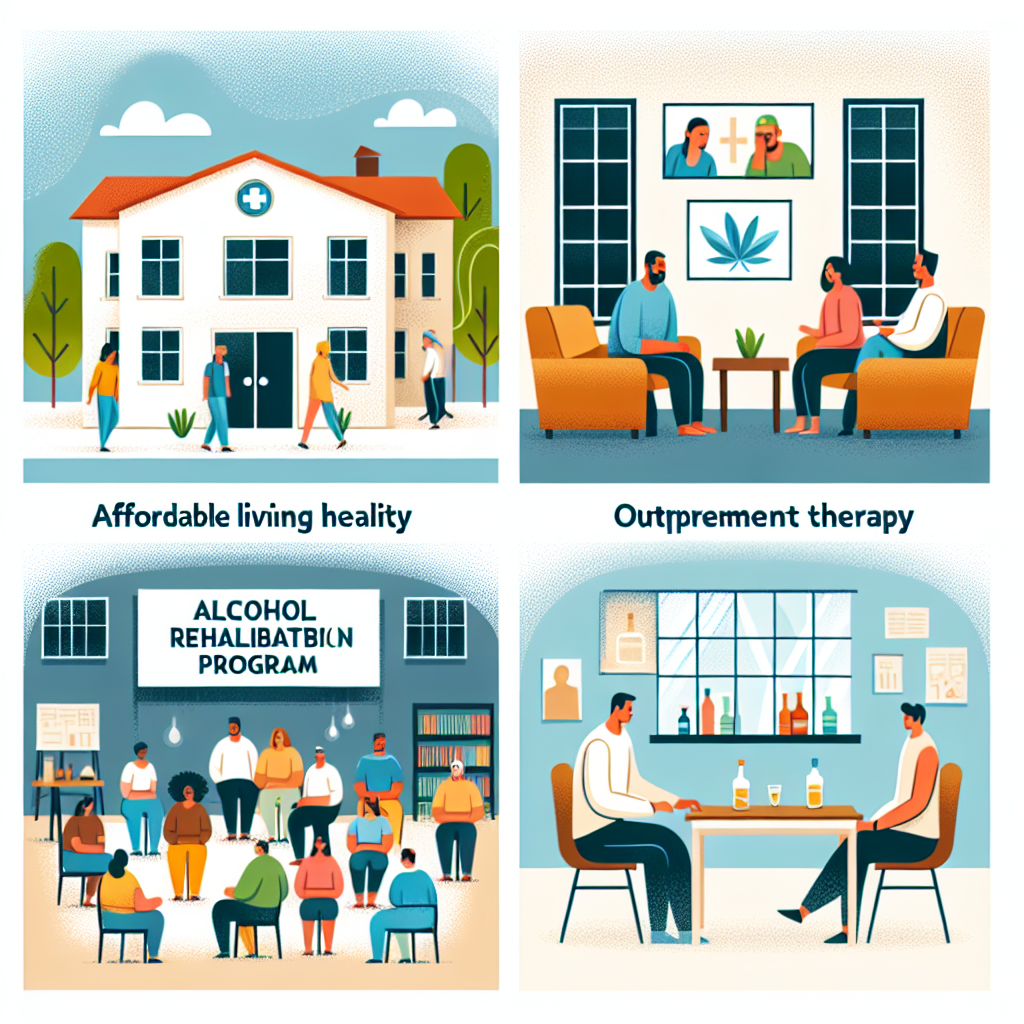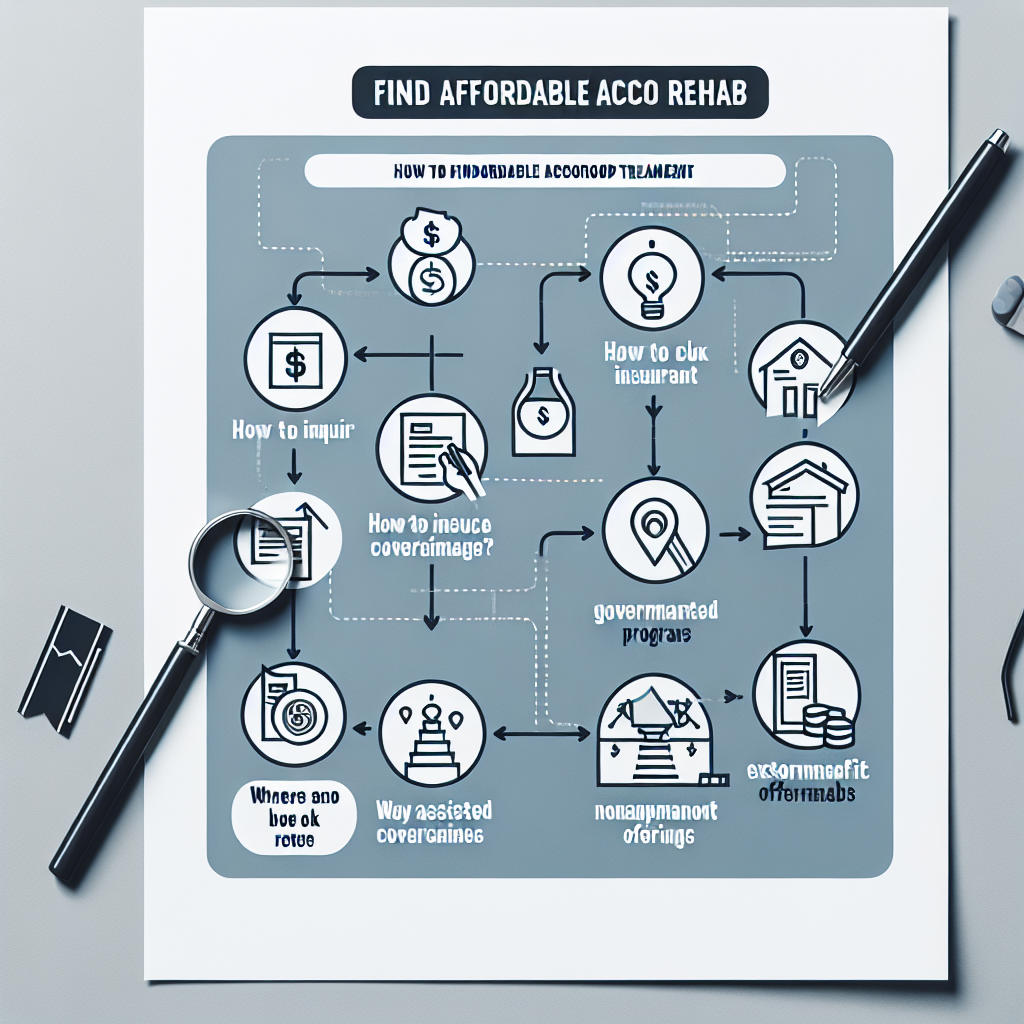-
Table of Contents

“Discover Affordable Paths to Recovery: Your Guide to Budget-Friendly Alcohol Rehab Programs”
Introduction
Finding affordable alcohol rehab programs can be a crucial step for individuals seeking recovery but facing financial constraints. This guide aims to provide practical strategies and resources to help locate cost-effective treatment options. By exploring various avenues such as government-funded programs, non-profit organizations, sliding scale fees, and insurance coverage, individuals can access the support they need without incurring overwhelming expenses. Understanding these options can empower those struggling with alcohol addiction to take the first step towards a healthier, sober life.
Top Strategies for Locating Affordable Alcohol Rehab Programs
Finding affordable alcohol rehab programs can be a daunting task, but with the right strategies, it is possible to access the help you need without breaking the bank. The journey to recovery is a courageous one, and financial constraints should not stand in the way of achieving sobriety. To begin with, it is essential to conduct thorough research. Start by exploring local resources, as many communities offer low-cost or even free rehab services. Community health centers, non-profit organizations, and local government agencies often provide support for individuals seeking treatment for alcohol addiction. These resources can be invaluable, offering both outpatient and inpatient services at reduced rates.
Another effective strategy is to look into state-funded rehab programs. These programs are designed to assist individuals who may not have the financial means to afford private treatment. State-funded facilities often provide comprehensive care, including detoxification, counseling, and aftercare support. To find these programs, you can contact your state’s health department or visit their website for more information. Additionally, many states have hotlines that can connect you with available resources and guide you through the application process.
Insurance can also play a significant role in making rehab more affordable. If you have health insurance, review your policy to understand what types of addiction treatment are covered. Many insurance plans, including those provided through the Affordable Care Act, cover a portion of rehab costs. Contact your insurance provider to get detailed information about your coverage and any out-of-pocket expenses you might incur. If you do not have insurance, consider applying for Medicaid, which offers coverage for addiction treatment to eligible individuals.
Sliding scale payment options are another avenue to explore. Many rehab centers offer sliding scale fees based on your income and ability to pay. This means that the cost of treatment is adjusted according to your financial situation, making it more accessible. When contacting rehab centers, inquire about their payment options and whether they offer sliding scale fees. This can significantly reduce the financial burden and make treatment more attainable.
Scholarships and grants are also available for those seeking alcohol rehab. Various organizations and foundations provide financial assistance to individuals who need help covering the cost of treatment. Research and apply for these opportunities, as they can provide substantial support. Websites like SAMHSA (Substance Abuse and Mental Health Services Administration) offer directories and resources to help you find scholarships and grants for rehab programs.
Moreover, consider outpatient treatment as a cost-effective alternative to inpatient rehab. Outpatient programs allow you to receive treatment while living at home, which can be less expensive than residential programs. These programs typically include counseling, group therapy, and support groups, providing a robust support system while allowing you to maintain your daily responsibilities.
Lastly, do not underestimate the power of support groups. Organizations like Alcoholics Anonymous (AA) offer free support and a sense of community for those in recovery. While support groups are not a substitute for professional treatment, they can complement your rehab program and provide ongoing encouragement and accountability.
In conclusion, finding affordable alcohol rehab programs requires a combination of research, resourcefulness, and persistence. By exploring local resources, state-funded programs, insurance options, sliding scale fees, scholarships, outpatient treatment, and support groups, you can access the help you need without overwhelming financial strain. Remember, the path to recovery is a step-by-step journey, and taking the first step towards finding affordable treatment is a powerful move towards a healthier, sober life.
Essential Tips for Finding Budget-Friendly Alcohol Rehabilitation Services
Finding affordable alcohol rehab programs can be a daunting task, especially when faced with the overwhelming number of options available. However, with the right approach and a bit of research, it is possible to locate budget-friendly rehabilitation services that do not compromise on quality. The journey to recovery is a significant step, and understanding how to navigate the financial aspects can make this path more accessible.
To begin with, it is essential to explore various types of rehab programs. Outpatient programs, for instance, tend to be more affordable than inpatient ones. These programs allow individuals to receive treatment while continuing with their daily responsibilities, such as work or school. By not requiring a residential stay, outpatient services can significantly reduce costs. Additionally, many outpatient programs offer sliding scale fees based on income, making them a viable option for those on a tight budget.
Another effective strategy is to look into non-profit organizations and community-based programs. Many non-profits are dedicated to providing affordable or even free rehabilitation services to those in need. These organizations often receive funding from government grants, donations, and other sources, enabling them to offer high-quality care at reduced rates. Community health centers and local health departments can also be valuable resources, as they frequently provide or can refer individuals to low-cost rehab services.
Insurance coverage is another critical factor to consider. Many health insurance plans, including those provided through the Affordable Care Act, cover some or all of the costs associated with alcohol rehab. It is crucial to thoroughly review your insurance policy and speak with a representative to understand what services are covered. In some cases, insurance may cover inpatient treatment, outpatient services, or both. If you do not have insurance, you may still be eligible for state-funded programs that offer financial assistance for rehab services.
Moreover, it is worth investigating payment plans and financing options offered by rehab facilities. Many centers understand the financial burden that treatment can impose and are willing to work with individuals to create manageable payment plans. This can include spreading the cost over several months or even years, making it more feasible for those with limited financial resources.
Support groups and peer-led programs, such as Alcoholics Anonymous (AA), can also play a crucial role in the recovery process. While these groups do not provide formal rehab services, they offer a supportive community and valuable resources at no cost. Engaging with such groups can complement professional treatment and provide ongoing support, which is essential for long-term recovery.
Additionally, it is beneficial to seek advice from professionals who specialize in addiction treatment. Counselors, social workers, and medical professionals can provide recommendations and referrals to affordable rehab programs. They often have extensive knowledge of available resources and can guide you towards options that fit your financial situation.
Lastly, do not underestimate the power of personal networks. Friends, family members, and acquaintances who have gone through similar experiences may have valuable insights and recommendations for affordable rehab programs. Their firsthand experiences can provide a realistic perspective on what to expect and how to manage costs effectively.
In conclusion, finding affordable alcohol rehab programs requires a combination of research, resourcefulness, and persistence. By exploring various types of programs, leveraging insurance coverage, seeking out non-profit organizations, and utilizing support networks, it is possible to access quality rehabilitation services without breaking the bank. Remember, the journey to recovery is a courageous one, and taking these steps can help make it a more attainable and sustainable endeavor.
Q&A
1. **Question:** What are some ways to find affordable alcohol rehab programs?
**Answer:** Research non-profit organizations and government-funded programs, and look for sliding scale fee options based on income.
2. **Question:** Can insurance help cover the cost of alcohol rehab programs?
**Answer:** Yes, many insurance plans, including Medicaid and Medicare, often cover part or all of the costs associated with alcohol rehab programs.
Conclusion
To find affordable alcohol rehab programs, research various options including non-profit organizations, government-funded programs, sliding scale fee facilities, and community health centers. Additionally, consider seeking assistance from social services, exploring online resources, and checking if your insurance covers any part of the treatment. Prioritize programs that offer comprehensive care while fitting within your budget constraints.



